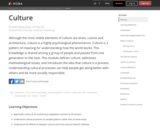
Text and links to all ancillary materials for Module 6
- Subject:
- Psychology
- Social and Behavioral Sciences
- Material Type:
- Module
- Reading
- Teaching/Learning Strategy
- Author:
- Neil Thin
- Robert Biswas-diener
- Date Added:
- 05/28/2021

Text and links to all ancillary materials for Module 6
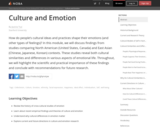
Text and links to all ancillary materials for Module 34
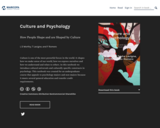
Culture is one of the most powerful forces in the world. It shapes how we make sense of our world, how we express ourselves and how we understand and relate to others. In this textbook we introduce cultural universals and culturally specific constructs in psychology. This textbook was created for an undergraduate course that appeals to psychology majors and non-majors because it meets several general education and transfer credit requirements.
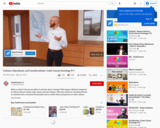
What is culture? How do we define it and how does it change? We’ll explore different categories of culture, like low culture, high culture, and sub-cultures. We'll also revisit our founding theories to consider both a structural functionalist and a conflict theory perspective on what cultures mean for society.
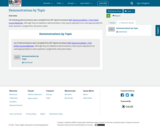
The following demonstrations were compiled from MIT OpenCourseware (MIT OpenCourseWare | Free Online Course Materials). Although they are labeled as demonstrations, they may be adjusted to be used appropriately for exam questions, assignments, discussion topics.
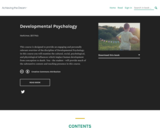
This course is designed to provide an engaging and personally relevant overview of the discipline of Developmental Psychology. In this course you will examine the cultural, social, psychological, and physiological influences which imp[act human development from conception to death. You - the student - will provide much of the substantive content and teaching presence in this course.
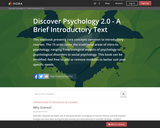
This textbook presents core concepts common to introductory courses. The 15 units cover the traditional areas of intro-to-psychology; ranging from biological aspects of psychology to psychological disorders to social psychology. This book can be modified: feel free to add or remove modules to better suit your specific needs.
This book includes a comprehensive instructor's manual, PowerPoint presentations, a test bank, reading anticipation guides, and adaptive student quizzes.
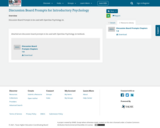
Discussion Board Prompts to be used with OpenStax Psychology 2e.
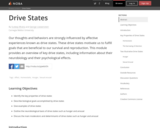
Our thoughts and behaviors are strongly influenced by affective experiences known as drive states. These drive states motivate us to fulfill goals that are beneficial to our survival and reproduction. This module provides an overview of key drive states, including information about their neurobiology and their psychological effects.
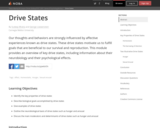
Text and links to all ancillary materials for Module 30
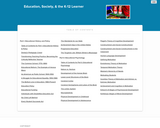
A web-based textbook/course created by Lumen Learning. Part 1 concerns Educational History and Policy, covering common educational policies from 1770's to the present; Part 2 is Educational Psychology, covering topics such as human brain, language and physical development, Nature v. Nurture, and theories and practices for working with K-12 youth.

This books lays the foundation for prospective teachers to learn about various teaching methodologies and covers material typically found in many teacher training programs. Chapters in the text can be assigned either from beginning to end, as with a conventional printed book, or they can be selected in some other sequence to meet the needs of particular students or classes. In general the first half of the book focuses on broader questions and principles taken from psychology per se, and the second half focuses on somewhat more practical issues of teaching. But the division between “theory” and “practice” is only approximate; all parts of the book draw on research, theory, and practical wisdom wherever appropriate. Chapter 2 is about learning theory, and Chapter 3 is about development; but as we point out, these topics overlap with each other as well as with the concerns of daily teaching. Chapter 4 is about several forms of student diversity (what might be called individual differences in another context), and Chapter 5 is about one form of diversity that has become prominent in schools recently—students with disabilities. Chapter 6 is about motivation, a topic that is heavily studied by psychological researchers, but that also poses perennial challenges to classroom teachers.
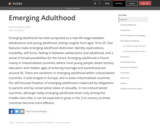
Text and links to all ancillary materials for Module 27
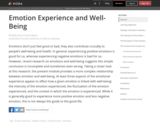
Text and links to all ancillary materials for Module 32
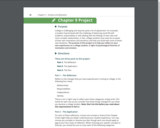
Purpose
College is challenging and requires quite a lot of adjustment. For example, a student may be faced with the challenge of balancing social life with academic responsibility or with dealing with the feelings of new roles and more complex relationships. In fact, college students may never be as aware of their own motivations and emotions until they are faced with some of these new situations. The purpose of this project is to help you reflect on your own experiences as a college student, in light of psychological theories of motivation and emotion.

People often think that the way we see, hear, and remember is like a video camera that reliably captures and stores every detail of our experience. Instead, the way we perceive the world and remember events is, in a very real sense, shaped by the sum of our experiences. As a result, we tend to see what we expect to see.
Think101x: The Science of Everyday Thinking is a free online course on edX that's open to anyone. You don't need any previous education or experience, and you can participate as much or as little as you'd like.
Learn more at: http://think101.org .
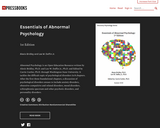
Abnormal Psychology is an Open Education Resource written by Alexis Bridley, Ph.D. and Lee W. Daffin Jr., Ph.D. and Edited by Carrie Cuttler, Ph.D. through Washington State University. It tackles the difficult topic of psychological disorders in 8 chapters. After the first three foundational chapters, a discussion of psychological disorders ensues to include anxiety disorders, obsessive-compulsive and related disorders, mood disorders, schizophrenia spectrum and other psychotic disorders, and personality disorders.
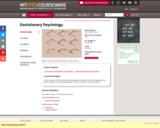
Current research on the evolution and development of cognition and affect, including intuitive physics, biology, and psychology, language, emotions sexuality, social relations.
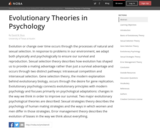
Text and links to all ancillary materials for Module 9
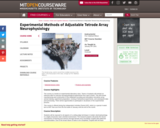
Experimental Methods of Adjustable Tetrode Array Neurophysiology